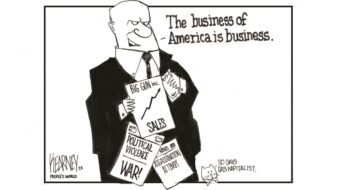
ST. PAUL, Minn.—Ten months ago, an upset Emily Olson, a former hair salon executive in the Twin Cities, brought a tearful tale—one that impacts millions of workers nationally—to Minnesota lawmakers. Now a top trust-busting federal agency plans to ride to her rescue, and to aid as many as 60 million other workers, too.
And if the Federal Trade Commission, with notable union endorsement, succeeds in its proposed rule to ban all non-compete clauses—past, present, and future—from employment contracts which individual workers sign, the top FTC official who worked on the proposal calculates it could put $250 billion-$300 billion in workers’ pockets in the long run.
Stopping U.S. employers from imposing non-compete clauses on workers would mark a sweeping change for the labor market, making it easier for people to switch jobs and deepening competition for workers in many industries.
Supporters of the proposal argue that non-compete clauses contribute to wage stagnation because one of the most effective ways for workers to raise their pay is by switching companies. Once characteristic mostly of highly-compensated positions, the clauses have become so commonplace that they have swept up many low-wage workers as well.
The FTC rule would help alleviate a lot of the pain workers face when firms enforce the clauses on workers who look for new jobs, pain Olson described to the Minnesota House Labor Committee.
“I’m here to defend the right to pursue happiness,” Olson told sponsoring State Rep. Jennifer Schultz, DFL-Duluth, an economist, and other lawmakers. “I want to tell you how the right was taken away from me by these non-complete clauses.
“I moved up the ladder really fast at the salon” where she was hired “and my title was to be regional director of four salons,” Olson explained last Feb. 22. But when she gave birth, Olson realized she couldn’t juggle a baby and a management job—and that’s when the non-compete language in her employment contract kicked in.
“I knew I had to leave. But before I could even find a job, I was sent many letters by their lawyer telling me to cease and desist. It was clear my employer owned me…. The 11 years of my career was down the toilet. I had to start at the bottom, and I was essentially homeless and on welfare. How is this legal? How can they get away with this? … I fight the immense amount of pain that a couple of clauses in the non-compete put on me and my family.”
In the video of the hearing, Olson closes by saying her daughter, now 11, says “I want to be like you, Mommy.” Remembering what she went through, Olson chokes up.

The FTC wants to ensure bosses can never get away with such language again, and that past workers hurt by it—like Olson—are made whole for their pain and suffering and limited income, too.
The Communications Workers union, the AFL-CIO, and the Service Employees are among the unions backing the FTC’s initiative, signing on to a joint letter Public Citizen drafted favoring it.
And it’s not just highly paid workers who get hurt, FTC Office of Policy Planning Director Elizabeth Wilkins told the PBS Newshour after the agency unveiled its proposed anti-non-compete rule on Jan. 5. Comments on it are open for 60 days.
Non-competes, Wilkins said, cover workers ranging from lawyers and executives to “middle-wage workers such as nurses and journalists” to janitors, security guards, “and folks who are flipping burgers.” In plain English, bosses shove contracts with non-compete clauses in front of job applicants and demand “sign this,” FTC said.
“These non-compete agreements…have become much more common, particularly in low-wage occupations,” said State Rep. Schultz at the hearing.
The Economic Policy Institute estimated in 2019 that 36 million to 60 million workers in the U.S. economy could be subject to non-compete restrictions in their job contracts. And in contrast to popular opinion that only executives are subject to the clauses, the study found that many low-wage workers are tied up by them as well, including more than quarter people making an average wage of less than $13 an hour.
Glendy Lopez, who styles hair in Missouri, was one such worker. She was told by her boss that she had to work Friday mornings or else. The 22-year-old recent cosmetology school grad couldn’t afford a babysitter though, so she found a job with another employer.
Just after switching jobs, her old boss sent her a text message saying Lopez was being sued for violating a non-compete agreement that blocked her from working for any other nearby salon for three months. As a single mother with a 2-year-old son, she had no choice but to find another place to work. “I had to in order to eat.”
Also named in the lawsuit was Lopez’s new employer, Kelly Hartley, who believes some non-compete agreements are simply absurd and aimed at controlling workers not protecting sensitive industry information.
“She’s not using any trade secrets to color somebody’s hair,” Hartley said of Lopez. “There’s nothing that she has brought over that has given my salon the edge.”
Lopez’s case is just one example of the ridiculous lengths bosses are going to in order to control where workers can earn a living. On Wednesday of this week, for example, the FTC took action against three separate companies for illegally imposing non-compete clauses against their workers, including low-wage security guards who were threatened with a $100,000 fine by their bosses if they went to work for a competitor.
The EPI study found that many companies still impose non-compete clauses even in states that already ban or restrict them, including in California, where they have been prohibited for a more than a hundred years.
The FTC wants to stop the whole abusive and exploitative practice. So do major progressive law groups, the Communications Workers, the Service Employees, the AFL-CIO, AFSCME, and United Food and Commercial Workers Local 400.
“Non-compete clauses reduce competition in labor markets, suppressing earnings and opportunity even for workers who are not directly subject to a noncompete,” Commission Chair Lina Khan said in unveiling the proposed rule. Two other Democratic-named commissioners joined her. The agency’s two Republicans screamed and predicted businesses would sue to stop the rule before it even starts.
“When workers subject to noncompete clauses are blocked from switching to jobs in which they would be better paid and more productive, unconstrained workers in that market are simultaneously denied the opportunity to replace them,” added Khan, a noted tough consumer advocate. Senate Republicans tried unsuccessfully to stop Khan’s nomination by Democratic President Joe Biden.
The FTC has moved aggressively to curb the power of major corporations under Khan, a legal scholar and Washington outsider whose appointment by Biden was seen as an anti-monopoly signal.
“This collective decline in job mobility means fewer job offers and an overall drop in wages, as firms have less incentive to compete for workers by offering higher pay, better benefits, greater say over scheduling, or more favorable conditions,” Khan said.

AFSCME, whose members include nurses and security guards, denounced non-compete clauses in a convention resolution last year. “We will challenge forced arbitration, misuse of non-compete clauses, and misclassification of workers as independent contractors,” the union said.
At a meeting of his cabinet, President Joe Biden called the FTC proposal “a huge step forward in banning non-compete agreements that are designed simply to lower people’s wages.” He said, “These agreements block millions of retail workers, construction workers, and other working folks from taking better jobs and getting better pay and benefits in the same field.”
The joint letter last month from the Communications Workers, the AFL-CIO, SEIU, and Local 400 urging FTC to quickly draft the rule, put it out for comment now, and then make it final. Wait too long, they warned, and a succeeding president—or Congress—could repeal it.
“Tens of millions of workers across the U.S. economy remain vulnerable to economic disempowerment through employers’ use of, or threat to use, non-compete clauses,” the joint letter says. “By limiting a worker’s mobility, non-competes drive down wages…and keep workers stuck in unsafe or hostile workplaces.
“Instead of retaining workers through coercive non-compete clauses, employers should maintain a loyal workforce by offering good wages, regular raises and promotions, and fair treatment.”
Vanessa Matsis-McCready, a lawyer and director of human resources for Engage PEO, a company providing HR services for small- and medium-sized firms, said, “There is a potential that it will contribute to the ‘great resignation’ that everyone is talking about to some degree, but employers are simply losing one of the tools in their toolbox and there are other ways to retain top talent.”
The end of non-compete clauses will mean workers have more power in deciding where and to whom they will sell their labor power in the capitalist labor market. Matsis-McCready predicts companies will have to pay up if they want to keep good workers: “You will see a lot of business trying to retain top talent via raises or other fringe benefits.”













Comments